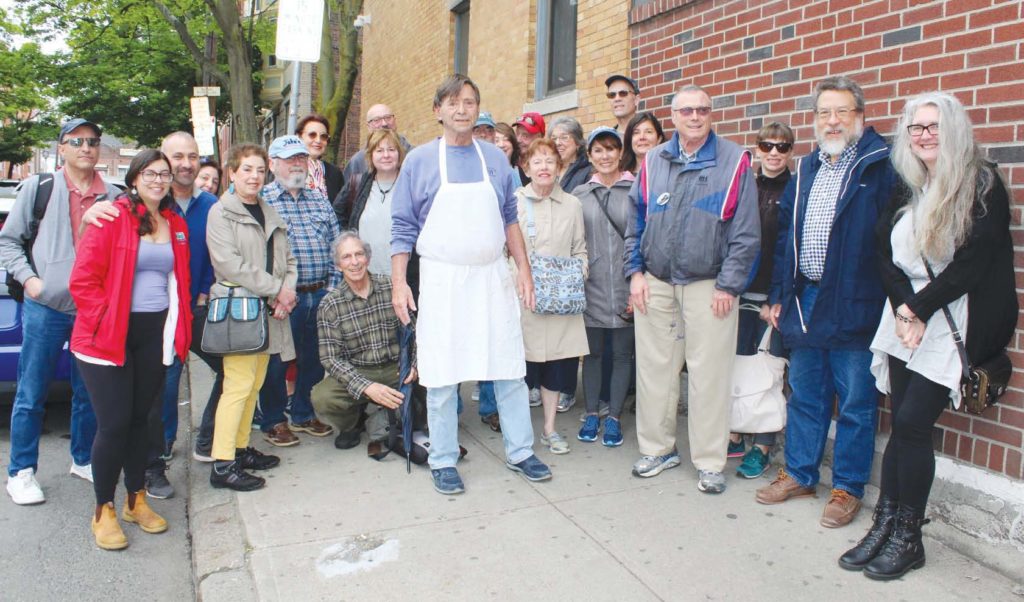Chelsea has an expert on its Jewish history and her name is Dr. Ellen Rovner.
Rovner, who holds a Ph.D in Anthropology from prestigious Brandeis University, guided a group of 20 through a tour of Chelsea’s Jewish history last Sunday and it was as if the esteemed chronicler had turned back the clock to a time when the city had a population of more than 20,000 Jews.
“Welcome to Chelsea, we want you to learn about the city’s rich history,” said Rovner in her opening remarks.

The tour began at Katz Bakery, where legendary bagel maker Richard Katz spoke of his shop’s history and gave the group a lesson on how to make a braided challah.
It continued on Winnisimmet Street where Rovner – who is the fourth generation of her family to have lived in Chelsea and whose father, Sam, a pharmacist, owned Hawthorne Pharmacy – explained how Jewish immigrants first arrived in Chelsea in the 19th century.
“Chelsea has been a gateway city since the 1840s when the Irish came to work in the growing industrial sector,” said Rovner. “I feel very connected to them because their story is somewhat like my story. It’s a different history, but they came with the same challenges of not knowing the language, wanting adequate housing, decent employment, and above all, a good education for their children.”
Rovner spoke about Nathan Morse, one of the first Jews who came to Chelsea in 1864. Morse is credited with starting the first synagogue on Winnisimmet Street, which later became the Walnut Street Synagogue.
“In 1866, the Kauffman Brothers came here and opened a hardware story for the immigrants who were coming here,” said Rovner. “People were attracted to this area because of the growing industrialization – paint companies, box companies, printing companies, and later rags and metal salvage (known as the junk business).”
She said Jews began to arrive in larger numbers in the 1890s.
“By 1910, there were 10,000 Jews in Chelsea,” said Rovner. “Seven years after the Chelsea Fire (1908), 83 percent of Chelsea’s population was foreign born – Irish, Jewish, Italian, and Polish.”
Rovner led the group to Chestnut Street where she expounded on the history of Dillon’s Russian Steam House.
“Lisa Rizzo has been running this business since the early 1990s and she’s been doing a fabulous job,” said Rovner. “My father used to come here. He would come here and see everyone he grew up with. It’s a strong sense of community that Dillon helped nurture and it still does. And there’s a Ladies Night on Mondays. It’s a great place.”
The tour continued on to two former synagogues on Chestnut Street and then to the Walnut Street Synagogue where President Ed Medros, who recently received the “Mensch Award” from the Jewish Journal newspaper, heartily welcomed the group at the front door.
Medros, as is his humble and gentlemanly way, couldn’t have been more hospitable to the gathering who yearned to learn about the history of one of the two remaining Jewish houses of worship in the city (Temple Emmanuel on Cary Avenue is the other).
“I grew up on Elm Street, which is now the dairy section of Market Basket,” jested Medros. “This building is 110 years old. The congregation is 132 years old. At one time there were 21 synagogues in the city.”
Medros added that the synagogue burned to the ground in the Chelsea Fire of 1908 and it was rebuilt.
“We still have the architectural drawings for the synagogue,” said Medros. “When they started out, they put a school downstairs, two classrooms, a kitchen, and a dining area. And the first floor was a prayer area. The next room over was a daily minyan room.
“The second floor is the main sanctuary and it seats 1,109 people – being orthodox, the men sit down below and the women sit in the balcony,” said Medros. “The ark was by Sam Katz, who built 20 arks.”
Leaving suitably impressed by Medros’ presentation, the tour group continued to be enlightened by Rovner at it moved on to Broadway and to the former home of the Chelsea Hebrew School (diagonally across from City Hall).
The group walked down Washington Avenue to Crescent Avenue and the former site of the Chelsea YMHA, a Jewish community center that bustled with social and athletic activities and was home to the famous Wild Animal Basketball League on Sunday mornings.
The final stop was just down the street at the Yeshiva (school), where many young students learned Hebrew and prepared for their bar mitzvahs.
Because of Rovner, who is founder of the Chelsea Gateway Project, the tour of Jewish Chelsea has become a must for historians and residents past and present.
Rovner announced that there will be additional tours on June 26, Sept. 12, and Oct. 24.
1 comment for “Chelsea’s Jewish History: Ellen Rovner Leads a Tour of Local Landmarks”